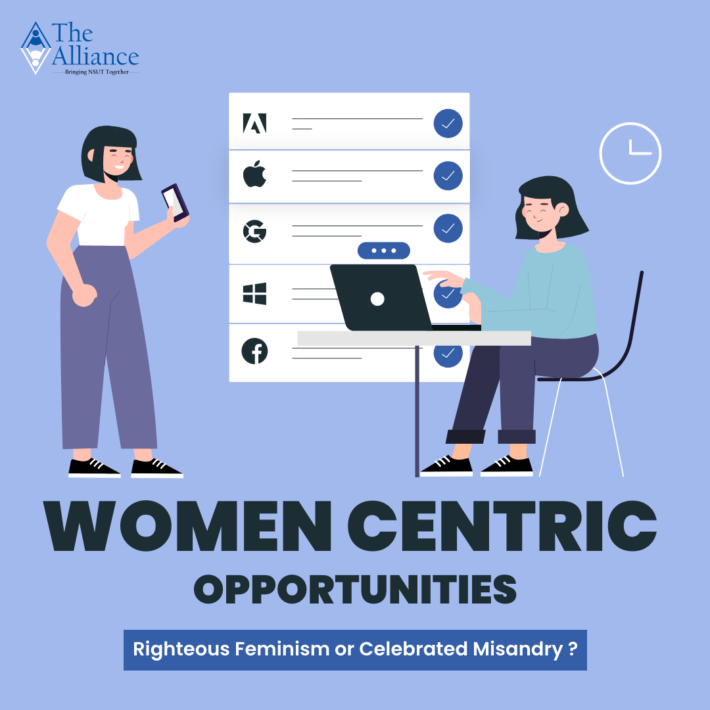By Aryaman Sharma, Batch of 2023
Every year, as the perilous season of placements and internships rolls in, it brings with it the intense pressure and nerve-wracking competition of getting into the most reputable of companies. The air gets filled with apprehension, cynicism and envy as the looming shadow of internalised misogyny begins to take a solid shape. All of this manifests itself as an outpour of fiery debates amongst the aspiring engineering candidates, expressing their displeasure at the rise of women centric placement and internship opportunities. It is during this time, the cries of men who complain about this injustice become unbearably loud, not to mention the elaborate posts seeking termination of this entire concept of favouring women for positions they do not deserve.
On almost every social media platform, comments and stories are shared aplenty, condemning companies that favour the recruitment of women, vilifying and questioning the merit of female counterparts who got in. Why does a less qualified woman get the job just because she’s female? Why is a man forced to give up his dream of working in a top company owing to his gender? Isn’t that sexism? Not all opinions are expressed politely, of course. Most of this banter reeks of disdain, mirth and hatred against a particular sex.
Quite frankly, this is very telling of the society we live in. Patriarchy is so pervasive in our culture since the beginning of mankind itself, that it has distorted the rationals of equality and balance, and propagated the idea that women cannot equal men in any walk of life. It’s rooted deep within our psyche, and more so in India. This entire system is reluctant to see women succeed, or in this case, taking a minuscule step in tasting that success. So when an idea is challenged to be uprooted, the opposition is expected.
Let’s be real – no one likes special treatment unless you are at the receiving end. But it’s imperative to look deeper. Two questions commonly arise: are women-centric schemes unfair because they’re given to women, no matter their economic upbringing, or is it because that they’re given to undeserving women, and could rather have been given to more meritorious students? If it’s the first one, well then, that’s just a reflection of misogyny. This line of thinking comes into play only when one considers themselves to be of the superior sex, and cannot withstand women flourishing and doing good for themselves on their own.
Moving on to the second thought process, here’s where it gets a little murky. The entire concept of “merit” is subjective. How can one measure merit if two entirely separate lives and different sets of struggles are involved? There is no level playing field involved between comparing a man and a woman.
There are various stories wherein women detail the bias and discrimination they have to face on a daily basis. Casual sexism, peers undermining their hard work and intellect, superiors who don’t take their ideas into account, colleagues doubting their capabilities at every moment whereas appreciating their male counterparts for the very basic of tasks, and the list goes on. Moreover, imagine how much worse it is in rural areas. Girls being forced into the kitchen at an early age while their brothers get to receive basic education is a common story in almost every household in the less privileged parts of India.
How then, can you measure different persons’ intelligence and worthiness for a job, especially if one doesn’t lead the fractured existence the other is bound to live through every single day?
It’s no secret that most boys, when entering an engineering school, sigh at the lack of girls in their classes. It’s rather hypocritical to witness the same men who yearn to see ‘hariyali’ on campus grounds, share their disparaging thoughts on female candidates getting selected for jobs that they not only deserved but owned from the beginning.
Women centric opportunities seek to bring diversity into the workplace. In fact, studies have shown that this improves the quality of work of the overall organisation. So even if a man is more skilled at using technology, women might actually contribute more to the workplace through soft skills and interaction with peers. A man’s meagerly significant individual programming ability cannot account for the productivity of an entire team nourished with emotional intelligence, an arena in which women have provenly outweighed their male counterparts. It’s almost hysterical to see men, who assume that girls got through the recruitment procedure owing to their gender, might not have any remarkable credentials themselves.
Lastly, bringing in women and providing them with jobs has become one of the most prominent ways to encourage female candidates to enter fields, in which they are commonly underrepresented. These schemes should be seen as a catalyst for encouraging women to align them with the mainstream, until societal attitude towards women working in those spaces has been balanced out.
If Google’s internship program is creating a critical mass of women so that, in the next generation, women feel comfortable joining the tech workforce, it should be celebrated. Inspiring more of them to step up and work towards providing for their families, attaining that level of independence that men have had since time immemorial, is an investment in our future, one which is brighter, more hopeful, and more endearing.
To wrap it up, here’s the deal. If you think women based internships are unfair, then start by removing the need for them. Give women the same playing field. Do your part in uprooting the patriarchy and the mindset that still exists. Treat women as equals in all spheres, and until the last woman isn’t forced to stop attending school, isn’t subjected to unfair treatment, isn’t dismissed for speaking up, and doesn’t have to deal with casual sexism, please let’s not take away the only entry level benefit they have that does a slight good to their betterment.

